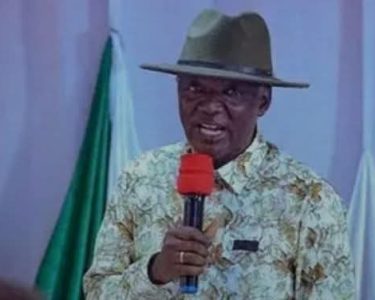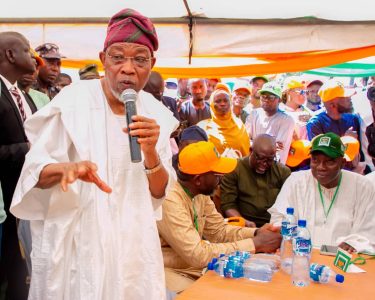Loyalty in Nigerian politics is a currency that fluctuates wildly in value. Today’s ally is tomorrow’s adversary, and yesterday’s hero is today’s villain. Few contemporary stories reflect this volatility more than that of Rauf Aregbesola, the former governor of Osun, whose dramatic shift from being one of President Bola Tinubu’s most trusted lieutenants to an opposition figure has reignited debates about betrayal, legacy, and the wilful distortion of political history.
The parallels between Aregbesola’s current predicament and the infamous rift between Chief Obafemi Awolowo and Chief Samuel Ladoke Akintola are striking. Some say this comparison a bit of an overreach, but I beg to differ. Both sagas revolve around broken alliances, accusations of treachery, and the bitter fallout of power struggles. Yet, as time has shown, history’s first draft is often written by the victors, only for later generations to revisit it with clearer eyes (and sometimes, raised eyebrows).
And speaking of history’s first draft, why don’t we talk about Winston Churchill, the man who famously said, “History will be kind to me, for I intend to write it.” The funny thing is that even Churchill couldn’t fully control his legacy. Modern historians have since dug up his controversial colonial-era policies, his less than stellar moments during World War II, his dismissive attitude toward Indian famine victims etc. etc.
This article examines why the demand for history to be “kind” is often just a euphemism for selective amnesia.
When the Going Was Good
Rauf Aregbesola was once a linchpin of the Tinubu political machine. As commissioner for works in Lagos State under Tinubu’s governorship (1999–2007), he earned a reputation as a no-nonsense, bulldozer-style administrator. When he later became governor of Osun State (2010–2018), he implemented policies that mirrored Tinubu’s playbook – infrastructure, education reforms, and youth empowerment. For years, he was the poster boy of loyalty.
But in Nigerian politics, loyalty is a one-way street. It only runs upward until someone higher up decides to reroute it. The unravelling began when Tinubu, Nigeria’s ultimate political godfather, backed his kinsman, Isiaka Oyetola, to succeed Aregbesola as governor in 2018. This was classic “blood first” politics, and Aregbesola, who probably had another successor in mind, did as Yoruba Zeus directed. Big mistake! Oyetola turned out to be a man supremely unsuited for high office. He lacked the moral courage to stand for principles bigger than himself, the strength to hear dissenting voices, or even the fundamental integrity to honour commitments.
The fallout has been spectacular. By 2022, Aregbesola, then serving as Minister of Interior, openly broke ranks with his boss, aligning with opposition figures and even forming his own faction. The Tinubu camp, never one for subtlety, branded him a traitor, much like Awolowo’s supporters condemned Akintola for “selling out” to the Northern political elite in the 1960s.
But here’s the thing about political “traitors,” their stories are rarely as simple as the labels slapped on them.
For decades, Ladoke Akintola was the Yoruba political bogeyman, the man who “betrayed” Awolowo by cosying up to the North. The narrative was black-and-white: Akintola was the villain, Awolowo the wronged hero. But in recent years, intelligent Yoruba have taken a second look. Some now argue that Awolowo’s own uncompromising stance might have contributed to the schism.
Politicians love to plead for history’s “kindness,” as if future generations will just nod along like lobotomised zombies. The same mindset that demonised Akintola is now at work against Aregbesola. But just as Akintola’s legacy is being reassessed, so too will Aregbesola’s. Future historians will ask:
- Was his break with Tinubu a betrayal, or a reaction to godfatherism gone rogue?
- Did his governance leave a lasting impact, or will it be buried under political mudslinging?
- And most importantly: Will history remember him as a traitor, or a politician who, at almost 70, audaciously broke ranks?
History’s Job Isn’t to Be Kind, It’s to Be Honest
Nigerian political history is full of figures who were prematurely judged, only for time to offer a more nuanced take. Awolowo was once regarded a rebel; today, he’s a hero. Akintola was a “traitor”; now, some see him as misunderstood.
Aregbesola’s story is still being written. His current status as Tinubu’s “black sheep” may dominate today’s headlines, but history’s final verdict won’t be based on hashtag battles or the drivel of keyboard warriors. The combatants of these petty battles will at best be mere footnotes when the full story is told. And that is if they’re lucky.
As Churchill’s legacy shows, no amount of memoir-writing or chest-thumping can erase the messy bits. History doesn’t do “kind.” It does “true.”
And in the end, that’s all that matters.
POSTSCRIPT
And now, for a theological plot twist worthy of Nollywood! If we zoom out and squint, Aregbesola’s feud with Tinubu might just be the universe’s way of saying, “My guy, you overdid it with the hero worship thing.” Aregbesola once genuflected before Tinubu like he was Olódùmarè reincarnated, immune to flaws and infallible. He defended policies, went to war on his behalf, and probably had a photograph of his Asiwaju on his person day and night. But as the Good Book warns, “Thou shalt have no other Gods before Me”
So here we are: Tinubu, the once all-knowing godfather, now playing the role of “retributor” by exiling Aregbesola. And Aregbesola seems to be pulling a classic “Saul-to-Paul” redemption arc, reborn as opposition firebrand.
Is this atonement? Or Nigerian politics serving heavenly satire?
Either way, we can’t be certain whose side God is on…but God definitely has a sense of humour.
Temitope Lakisokun, a Communications Professional and Political Consultant, writes from Lagos, Nigeria.




